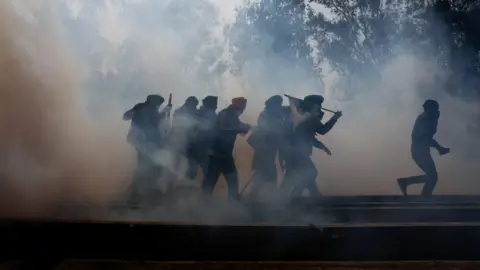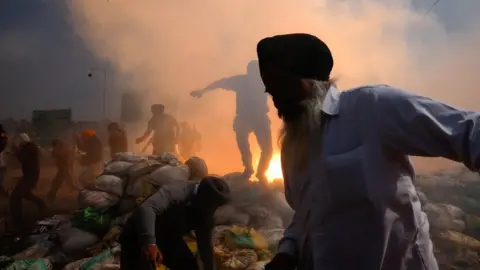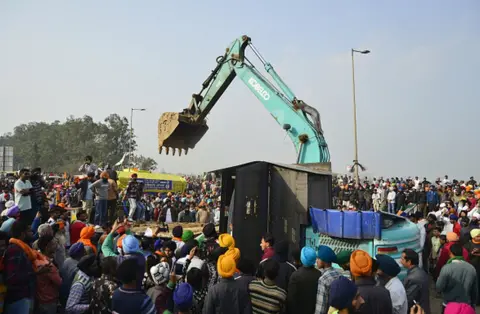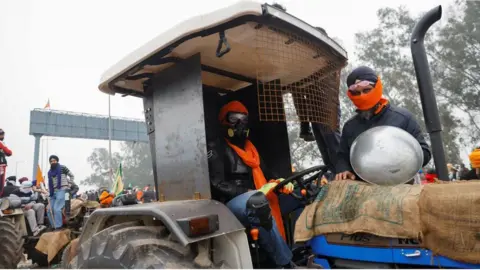Farmers' protest: Death at Punjab border denied by police
 Reuters
ReutersA protester has died as farmers attempted to resume their march on India's capital after four rounds of talks with the federal government failed to end the deadlock.
The 22-year-old's death was confirmed to the BBC by Punjab's health minister and a hospital official.
The farmers' union had earlier alleged the protester had died during police action.
Haryana Police, however, said "no farmer" had died during the protest.
The farmers - who are demanding assured prices for their crops - have been clashing with police, who are trying to block them reaching Delhi.
The last time they held a protest in the capital, they hunkered down at Delhi's borders for months. As a result, officials are trying to prevent a repeat, fortifying the city's borders with several layers of barricades and barbed wires.
Police had been firing teargas at the protesters as they attempted to move towards the border, BBC Punjabi reported. The farmers used masks, gloves and safety suits to protect themselves from the shelling.
Farmer Shubh Karan Singh's death on the border of Punjab and Haryana is the first since the protest began on 13 February.
He was from Balon village in the Bathinda district of Punjab, his uncle told the BBC, and was the sole breadwinner of his family.
According to Dr Harnam Singh Rekhi, medical superintendent of Rajindra Hospital of Patiala, his cause of death was a bullet wound to the head. He told the BBC more details would be available after a post-mortem examination.
 Reuters
ReutersDr Balbir Singh, Punjab's health minister, told the BBC a second boy had also sustained a bullet wound but "luckily he has survived". He added that at least 13 people were being treated for injuries in Punjab hospitals.
But Haryana Police's official X (formerly Twitter) account said reports of a farmer's death were "just a rumour" late on Wednesday.
It also accused protesters of attacking officers "using sticks and maces along with stone pelting", injuring 12.
Farmers say they will now do a sit-in protest for the next two days.
Earlier, they had warned they would use heavy machinery to push through to Delhi, with visuals from the Shambhu border - where many farmers have been since last week - showing thousands preparing to push past barriers using bulldozers and earthmovers.
Many among the protesters flew kites to interfere with the police's operation of drones, which have been used to drop tear gas shells on them.
Farm leaders also made frequent announcements for unity, appealing to the security forces to not attack their "brethren".
 Getty Images
Getty ImagesAgriculture Minister Arjun Munde, meanwhile, has invited farmers for a fifth round of talks. "It is important for us to maintain peace," he wrote on X. Farmers are yet to respond to this invite.
The latest round of protests also come months before the general elections in which Prime Minister Narendra Modi's Bharatiya Janata Party (BJP) is seeking a third term in power. Farmers form an influential voting bloc in India and analysts say the government will be keen not to anger or alienate them.
Farmers' leaders say their march is peaceful and have urged the government to let them enter the capital.
"We tried our best from our side. We attended the meetings and discussed every issue, now the decision lies with the government. We will remain peaceful, but we should be allowed to remove these barriers and march towards Delhi," farm leader Sarwan Singh Pandher told reporters.
The government has so far held four rounds of meetings with farmers' unions. Protesters say the government did not keep promises made during the 2020-21 protest, and also have demands including pensions and a debt waiver.
 Reuters
ReutersOn Monday, farmers' leaders rejected a proposal to buy some crops at assured prices on a five-year contract, saying the offer was "not in their interest".
The government had proposed buying pulses, maize and cotton at guaranteed floor prices - also known as Minimum Support Price or MSP - through cooperatives for five years.
But the farmers say that they will stand by their demand of a "legal guarantee for MSP on all 23 crops".
Meanwhile, police in Haryana have asked their counterparts in Punjab to keep women, children and journalists at least 1km away from the borders for their safety. They have also asked the Punjab police to seize bulldozers and other heavy machinery from the protesting sites.
In Delhi, security has been tightened and large gatherings have been banned for a month.

